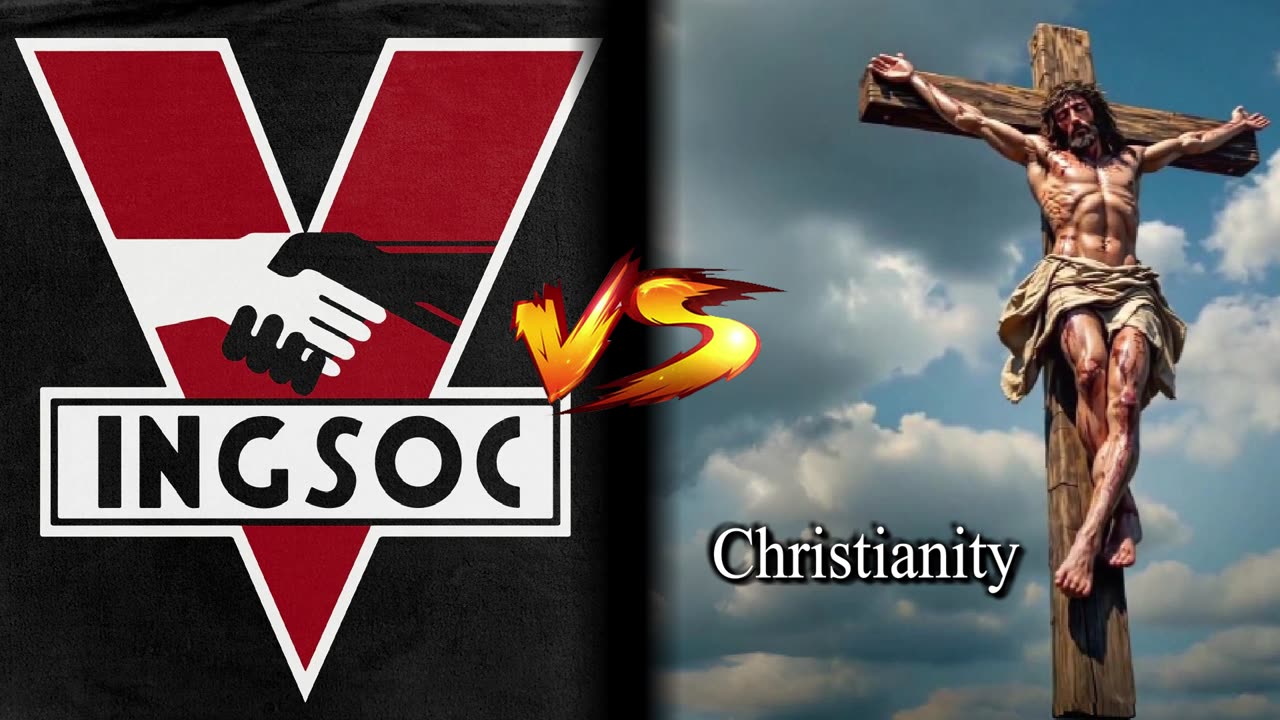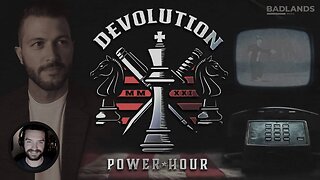Premium Only Content

1984 vs. Christianity
1984 vs. Christianity.
The process of religion is slow and calculated. It begins by targeting vulnerable people—children, the isolated, the poor—within a society broken enough to make religion seem like a lifeline. In such an environment, people walk through the doors of a church not out of conviction, but desperation for belonging.
That’s when the love bombing begins. Warmth, acceptance, a sense of purpose. But it comes with strings. Once the bond is formed, conditions are introduced: say you love Jesus, show your devotion, start giving money. The affection becomes transactional, tied to obedience.
It’s a psychological breakdown that mirrors the arc of 1984. Just as Winston is tortured into betraying his love for Julia and finally proclaiming love for Big Brother, the church, through emotional manipulation, wears down its members—particularly straight men—until expressions of love for Jesus take on a distorted, even erotic form. It’s not about faith; it’s about control. The goal isn’t salvation—it’s submission.
This manipulation isn’t accidental. It’s engineered. From childhood indoctrination through youth programs and Sunday school, religious institutions groom young minds to equate obedience with virtue. Children are told that questioning is sinful, that doubt is dangerous. The authority of scripture is absolute, even when it contradicts basic reason or morality. This early programming plants deep psychological roots that are difficult to pull out in adulthood.
The church often cloaks itself in community service, but even these efforts come with an agenda. Food drives, mission trips, and outreach programs are often leveraged as recruitment tools. The underlying message is clear: we help you, now come to church. What appears on the surface as compassion is often just another hook. The poor aren’t being lifted up as much as they are being pulled in. The needy aren’t just being fed; they’re being converted.
Power dynamics play a central role. Religion creates strict hierarchies—God above all, the church leaders next, then the obedient congregation. Those who challenge the hierarchy are ostracized or punished. And within this framework, the most insidious control often targets straight men. The paradox here is deliberate. Men are told to be leaders, providers, protectors—but within the church, they must be submissive to Christ, humble before God, deferent to the pastor. This tension produces a kind of spiritual schizophrenia. To maintain status within their faith, men must relinquish the very traits society tells them define masculinity.
This tension is exploited through rituals and language that become increasingly intimate. Men are encouraged to say, "I love Jesus" with passion, to confess sins in detail, to cry in front of male leaders, to view themselves as brides to Christ. These aren’t benign metaphors. They rewire emotional and sexual expression, conflating devotion with desire. The result is a confusion that makes true introspection almost impossible. Faith is no longer about a personal relationship with the divine. It’s about enmeshment with the institution.
Religion, in this model, doesn’t offer answers. It offers scripts. Standardized prayers. Memorized verses. Stock phrases like "God has a plan" or "Trust in Him." These clichés serve to shut down thought, to discourage nuanced conversation. They act as buffers against discomfort. When life gets hard, you're told to pray more, believe harder, tithe despite your finances. The implication is always that any failure lies with you, not the system.
Financial control is a key element. Tithing is framed as an act of devotion, but in reality, it's a form of coercion. Prosperity gospel churches take this to extremes, preaching that wealth is a sign of God's favor. So when you're broke, it's not because you're underpaid or exploited—it's because your faith isn't strong enough. This not only extracts money from the vulnerable, it gaslights them into accepting poverty as spiritual failure.
The emotional manipulation bleeds into relationships. Within many religious communities, especially conservative ones, dating and marriage are tightly regulated. Purity culture teaches that sex is sinful outside marriage, that women must be submissive, that men must lead. This damages everyone. Women are pressured to forgive abuse, to stay in harmful marriages, to be silent. Men are told to suppress emotion unless it’s channeled toward God. The result is a generation of people who don’t know how to relate to each other outside religious roles.
And what about those who don't fit? LGBTQ+ individuals are often cast out or forced into conversion therapy. Their very identities are labeled as sin. This isn’t spiritual guidance; it's psychological warfare. Many are driven to depression, self-harm, or suicide because they’re told that being themselves means being damned. The church claims to love the sinner but hate the sin, but in practice, it’s just hate cloaked in doctrine.
This isn’t to say that every believer is malicious or every religious act is harmful. Many people find genuine comfort in their faith, and some communities do real good. But we can’t ignore the structural issues. Religion, as it is often practiced, prioritizes institutional survival over individual well-being. It discourages critical thinking, isolates dissenters, and exerts control over bodies, minds, and wallets.
The parallels to totalitarian regimes are clear. Like in Orwell’s 1984, the goal is not merely compliance, but internalized devotion. It's not enough to obey; you must love the system that subjugates you. You must convince yourself that the cage is freedom, that the rules are grace, that the suffering is sacred. The church becomes the arbiter of reality. To question it is to risk exile, or worse, eternal damnation.
Deconstruction—the process of questioning and unlearning harmful religious beliefs—is often met with hostility. Those who leave the church are painted as rebellious, bitter, or lost. Friendships are severed, families torn apart. The church doesn’t just let people go. It marks them. This is because doubt is contagious. If one person starts asking questions, others might follow. So the institution circles the wagons, demonizes dissent, and tightens its grip.
For many who leave, recovery is long and painful. There’s often guilt, fear, and deep psychological trauma. People must relearn how to trust themselves, how to think independently, how to form relationships not based on roles but on mutual respect. Therapy helps, as do online communities of fellow survivors. But the scars are real. Leaving a high-control religion isn’t just a change in belief; it’s a total identity shift.
And yet, despite the damage, the machine keeps running. New converts are brought in. Children are raised in it. The cycle continues. Because as long as society has gaps—economic, emotional, existential—religion will exploit them. As long as people are isolated, desperate, or grieving, there will be someone ready to offer them Jesus as a solution. Not for their benefit, but for the institution’s.
What would it look like to break the cycle? It starts with honesty. With teaching children how to think, not what to think. With creating communities that meet people’s needs without strings attached. With holding religious leaders accountable, legally and socially. With removing tax-exempt status from churches that function as businesses. With centering empathy over doctrine, curiosity over conformity.
We need to understand that belief isn’t inherently virtuous. That faith, when used to manipulate, becomes a weapon. That institutions built on fear and shame cannot claim moral authority. And most importantly, that people deserve freedom—not just political or physical, but emotional and intellectual. Freedom to ask questions. Freedom to say no. Freedom to walk away.
Religion, at its worst, is not just a personal belief system. It’s a tool of control. And if we want a world where people can live authentically and safely, we need to recognize that control for what it is. Not divine. Not sacred. Just power, dressed in scripture.
Until then, the pattern continues. Vulnerable people will be targeted. Emotional needs will be exploited. And the cycle of control will mask itself as love. The question isn’t whether religion can change. The question is whether we’re willing to see it clearly enough to demand that it does.
-
 6:48
6:48
Buddy Brown
12 hours ago $12.02 earnedWatch What Happens When you Set up a "Charlie Tent" at HBCU! | Buddy Brown
159K66 -
 3:02:05
3:02:05
FreshandFit
13 hours agoObese Black Girls Got Triggered Over THIS...
115K93 -
 2:07:44
2:07:44
Inverted World Live
8 hours agoPentagon Says it Solved UFO Cases, Tyler Robinson "Roommate" Missing | Ep. 113
47.5K17 -
 2:30:00
2:30:00
Badlands Media
14 hours agoDevolution Power Hour Ep. 392: Psyops, Paper Tigers, and the Path to Sovereignty
97.3K19 -
 3:02:08
3:02:08
TimcastIRL
9 hours agoLeftist Terror Attack On ICE In Dallas, Jimmy Kimmel Doubles Down Insulting MAGA | Timcast IRL
353K141 -
 1:17:35
1:17:35
Man in America
14 hours agoIs Starlink RIPPING Us Apart from the Inside Out? w/ Cory Hillis
56.4K19 -
 55:40
55:40
TheSaltyCracker
8 hours agoIdiots Chug Tylenol PT2 ReeEEStream 9-24-25
122K227 -
 5:55:01
5:55:01
Akademiks
9 hours agoYoung Thug Dissing YFN Lucci. Ready to Go back to Jail. Offset vs Cardi b
72.3K4 -
 7:07
7:07
Colion Noir
17 hours agoCalifornia Just Banned All Glocks
63.1K43 -
 1:10:24
1:10:24
Adam Does Movies
10 hours ago $3.08 earnedTalking Movies + Ask Me Anything - LIVE
52.4K1